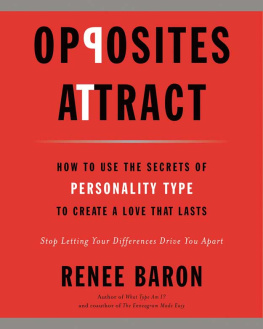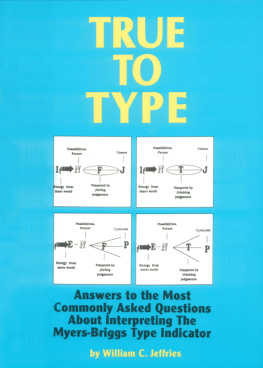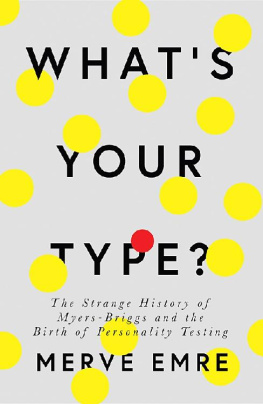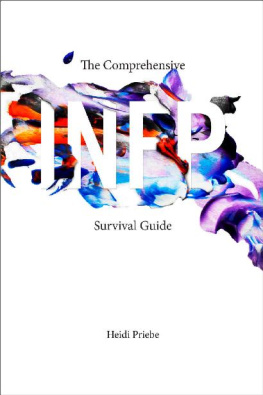Gifts Differing
GIFTS DIFFERING
Understanding Personality Type
Isabel Briggs Myers
With Peter B. Myers

Published by CPP, Inc., 1055 Joaquin Road, 2nd Floor, Mountain View, CA 94043; 800-624-1765.
Copyright 1980, 1995 by CPP, Inc. All rights reserved. No part of this book may be reproduced, stored in a retrieval system, or transmitted in any form or media or by any means, electrical, mechanical, photocopying, recording, or otherwise, without the prior written permission of the publisher, except in the case of brief quotations embodied in critical articles or reviews.
Myers-Briggs Type Indicator, MBTI, and Introduction to Type are trademarks or registered trademarks of the Myers-Briggs Type Indicator Trust in the United States and other countries.
Reprinted by Davies-Black Publishing under special license from CPP, Inc.
Printed in the United States of America.
13 12 11 10 09 10 9 8 7 6 5 4 3 2 1
Acknowledgments
We thank the following researchers for granting permission to use their work as sources of figures in Gifts Differing: W. B. Stephens (1972).
Library of Congress Cataloging-in-Publication Data
Myers, Isabel Briggs.
Gifts differing: understanding personality type / Isabel Briggs Myers with
Peter B. Myers.
p. cm.
Originally published: Palo Alto, CA: Consulting Psychologists Press, c1980.
Includes bibliographical references and index.
eISBN: 978-1-47364-379-6
1. Typology (Psychology). 2. Myers-Briggs Type Indicator.
I. Myers, Peter B. II. Title.
BF698.3.M94 1995
155.264dc20
95-4184
First edition
First printing 1980
To all who desire to make fuller use of their gifts
For as we have many members in one body,
and all members have not the same office:
So we, being many, are one body
and every one members one of another.
Having then gifts differing
Rom. 12: 48
Contents
Preface
THIS IS A family book. Whether your family is made up of blood relatives, close friends, or colleagues in the workplace, the ideas and concepts in this book can help you to understand yourself and your reactions in the process of living every day, and they can help you to understand and appreciate the reactions of those around you who, with differing gifts, seem to be marching to a different drummer.
If you have wondered about the diverse and often startlingly different ways that people important to you, or just people around you, seem to look at the world or react to situations, this book will interest you. If you have a problem understanding or communicating with someone you care abouta parent, a child, a co-worker, or a significant otherthe ideas in this book just may be what you have been looking for.
The author, Isabel Briggs Myers, was my mother. After a twenty-year fight, she finally succumbed to cancer at the age of 82, just before publication of the first edition. Her goal was to help people to be happy and effective in whatever they chose to do, and the fierceness of this desire gave her the strength to keep going until her book was finished. It is a tribute to her insight that, since 1980, over 100,000 people have read Gifts Differing, with more copies sold each year than in the previous year.
Her book presents, in understandable language, the ideas about personality type of the famous Swiss psychologist, Carl Gustav Jung, as they apply to normal everyday people with normal everyday problems. Her book has helped thousands of people recognize the different ways in which each of us act and react and make sense of the world in our relationships with others. Her gift has been in repudiating the old, but too commonly held, idea that we are each in various ways a deviation from some ideal normal person. She replaced it with the recognition that each of us is born with different gifts, with unique imprints of how we prefer to use our minds and values and feelings in the business of living everyday. Jung divided the business of living every day into two simple mental activities: taking in, or becoming aware of, new information (which he called perception); and deciding, or coming to some conclusion about that information (which he didnt bother to name).
Jung wrote about his theory of type more than 70 years ago, but as a practicing psychologist, he generally saw patients with severe psychological problems, and he was primarily concerned with the unsuccessful or unbalanced development of type he found in people who were ineffective, unhappy, and seeking professional help. He was not particularly interested in the aspects of psychological type displayed by ordinary healthy people. In addition, he wrote in German for a largely specialized audience of psychologists. Even the English translation of his work Psychological Types makes heavy reading. It is not surprising, therefore, that his theory of personality type found scant enthusiasm among ordinary people interested in human personality.
Isabel Myers, on the other hand, while not trained as a psychologist, devoted the entire second half of her life to interpreting and adapting Jungs theory to help ordinary, healthy, normal people understand that it is all right to be unique individuals, often quite unlike those around them, and that many, if not most, of the differences, problems, and misunderstandings they may have experienced with others can be explained in terms of the perfectly normal, but different, choices in the way people take in and process information.
The premise of this book is that each of us has a set of gifts, a set of mental tools that we have become comfortable using and thus reach for in the everyday business of living. Although we all have access to the same basic tools in our psychological toolbox, each of us is more comfortable with and thus prefers a particular tool (or set of tools) for a particular task. It is our unique set of these preferences that gives us our distinct personality and makes us appear similar or dissimilar to others.
A common problem that has often led to stress for many of us is our apparent inability, at times, to communicate about something that is very clear and personally very important to us to someone we care about in a way that that person agrees, or at least understands its importance to us. We may feel hurt and rejected by the lack of recognition of our concern or we may feel baffled by the failure of that person to appreciate the logic of our position. In Gifts Differing, Isabel Myers gives us recognizable explanations for these and many other normal, but different, uses of our personality tools and points the way to the constructive uses of human differences.
To help put this book in perspective, a little history of how it came to be written may be appropriate. Isabel Myers and her mother, Katharine Cook Briggs, had been interested in Jungs theory for about 16 years when the Second World War took many men from the industrial workforce into the services and brought many women out of their normal activities to replace them. Since, for the majority of these women, the heavy industrial workplace was strange new territory, my mother and grandmother thought that a knowledge of ones personality preferences in terms of Jungian type theory might be a valuable aid to identifying the kind of job for the war effort in which someone without previous relevant experience could be most comfortable and effective. They searched in vain for a test or some indicator of a persons Jungian preferences and finally decided to create one of their own. The result was to become the
Next page







